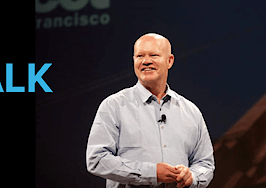
Leonard Steinberg
Leonard Steinberg, the president of Compass, specializes in the marketing of high-end New York real estate, bringing in more than $2 billion in transactions.
As his move to Compass signifies, Steinberg represents a new breed of brokers who are teaming up with new broker models and technology firms, as the real estate technology startup industry continues to grow.
Steinberg will be speaking at Global Connect in New York City on April 7.
Brad Inman: I am so excited today to have with me Leonard Steinberg, a top-producing Realtor from New York City who is just all over the place doing such interesting things. He is a guy that upholds the standards of the best and the brightest of real estate. He is involved as a traditional broker representing sellers, primarily. But he also has joined a leading technology brokerage. Welcome Leonard Steinberg!
Leonard Steinberg: Hi, How are you?
I’m great. Hey, how should we define Compass? You’re in New York City. We call it a tech startup, but is it really a tech startup?
Well, I think everyone wants to pigeonhole us as either a tech startup or a real estate startup. And the fact is, we are a new hybrid of real estate enterprise, which combines the best of technology with the best of traditional brokerages. So we are a hybrid of the traditional model, infusing technology into the real estate brokerage experience.
Gotcha. Now, when you say best of brokerage, Leonard, what is the best of brokerage?
Well, the best of brokerage, I think, is what Compass is trying to achieve not only infusing the entire equation with technology that helps the consumer, but as importantly, we want to infuse technology into the agent experience.
There are outstanding agents out there, but they are in the minority. I think a good number of agents out there don’t have experience, don’t have the tools, don’t have the experience to really provide the consumer with a great experience.
So step no. 1 is to to bring in only the best of the industry, and we really focus our attention on really infusing and attracting the best in the business. Once they’re in the Compass realm and family, what we want to do is provide them with the best technology that frees up as much of their time as possible so that they can refocus their attention on the consumer experience because there’s no better time served than an agent working directly with the consumer.
Technology should be there to fuel — it shouldn’t be there to replace — agents.
So you really believe in the traditional model. But you’re saying, “We’re going to give tech tools to the consumer and to the agent.” I mean, a lot of these agents are still pushing paper around; they’re acting like secretaries. I’ve done deals in New York City, and I’m always like, what the heck, this goes back to the nineteenth or to the Gutenberg press.
No, it’s painful. It’s painful to look at the industry in relation to other industries, to see how far other industries have progressed and how slowly real estate has adapted to the new world.
I think the biggest element that has prevented that from happening is, no. 1, companies that don’t want to reinvest profits into systems.
And no. 2 is fear, fear that the technology will replace the agent, and the exact opposite is true. If you take great technology, great agents, put them together, have the agents speak to the engineers and scientists who do the technology to tell them exactly what you need and want — then you have a winning recipe.
Let’s shift to the housing market. You work in New York City, probably a global real estate capital, notorious for very very high-end buyers, and we have all this luxury housing coming on the scene in New York everywhere I look. It’s kind of like Los Angeles, there’s just tons of luxury housing being built at a time when there seems to be heebie-jeebies on the part of buyers because of the elections or the stock market. Tell me, what’s going on with the market here in New York City.
Well, the New York market cannot be summarized in one word, and I think the biggest mistake all real estate markets do is, they average. I just saw a report that came out this week that talked about how New York City is the fourth-most-expensive city in the world behind, I think, Singapore, London and Monaco. And they talk about multiple thousands of dollars per square foot for high-end real estate.
And that may be true in pockets. But the reality is, there are multiple markets within each market. And in certain areas, there’s overdevelopment, in certain areas there’s under-development. But we also have to remember statistics. And I think there are some very, very interesting statistics about the volume of product in the New York City market.
It’s a very, very small percentage — around 13 percent of all apartments in the housing stock of New York City, are owned co-ops or condos. Then you have individual houses as well, which are mostly in the boroughs. But when you look at an area like Manhattan, the volume of owned housing is a small, small fraction.
Then, when you look at the percentage that is condominium, that allows for a bigger group of buyers to no. 1, be able to afford to buy in the building, and no. 2, desire not to have the co-op approval process. That becomes an even smaller amount.
So looking at the global picture, knowing that Manhattan and the whole New York tri-state attracts a very broad volume of wealthier people, I think the inventory that is coming out is just going to take longer to absorb. I think the brakes of the system, the automatic forces of the free market system are already in the works; I can see banks are already cutting back on financing buildings that aren’t sound investments, and I can also see developers pulling back on certain projects where they say, “Our pricing expectations are simply too high for this to make sense,” or “We have to cut back on our pricing expectations, because they’re unrealistic.”
So you’re already seeing adjustment in the marketplace because people are smart and they see what’s going on. Tell me this: Do you worry about all these events globally, and are buyers just going through a period here where they’ll get over it? Because you could arguably say the economy is strong, it’s not like New York’s suffering too much, rates are crazily low, there’s a lot of liquidity, and there continue to be a lot of rich people. It’s almost like everything that’s happening is psychological, to a degree.
I worry every day, and I have been worrying every day for the last 51 years. And I should. I feel certain I’ll be worrying going forward.
I think there are so many global events that happen on a daily basis, some reported, others not reported, that it can drive you a bit nuts. I also think that the a media is so competitive these days that to get ratings and to get readership or viewership requires sensationalist headlines. And without a sensational headline, you could go out of business. So I think the Kardashian-ization of our planet has made the extremes of newsworthiness a little too intense and frightening, frankly.
But it definitely impacts markets when you have that sense of uncertainty. Uncertainty is something wealthy people don’t like. Wealthy people don’t necessarily have significantly less wealth when markets go through changes, but when they lose confidence in the market or if their feeling is that market pricing is going to come down, that is when they put the brakes on. But what we are coming out of is a three-year period of intense, exaggerated, unrealistic market conditions, where properties were selling at a speed and a rate and a price. that was intensely exaggerated.
Now we’re approaching and entering a new market, which is a new normal. Which may be what normal really is.
You’re a real estate guy; you’re a respected real estate guy. You have a lot of integrity and credibility, and you follow through. The next President of the United States could possibly be a New York real estate guy. Not to drag you into politics, but you’re in New York, you know real estate people. Is this scary or an opportunity, or what do you think? Could it happen?
You know, I think the chances of a Donald Trump becoming President are very strong, as much as you could say the chances of a Hillary Clinton being the next President are very strong. I never like to guess elections. And I also don’t necessarily like to guess how a President will act.
What I do know, however, is that I am the president of Compass. And my actions set a tone for my company. But I am not the company. I think people underestimate the power of the Senate, the Congress and the other 300 million people that constitute the United States of America.
So I do think whereas the President’s role has great impact, I think its impact on a day-to-day basis are very very very different. So I’m not guessing politics at all, and I think anyone who guessed it six months ago has been proven dramatically wrong.
Oh my gosh, everybody has been wrong. Leonard, you just said it very well: Whatever happens we do have some checks and balances in place. Whether it’s Hillary, whether it’s there it’s Trump we theoretically have some checks and balances in place to watch these characters, whoever it might be.
I also think, with any change that happens, my philosophy is, “adapt or die.” You have to adapt in real estate and in life in general now a lot quicker than ever before because adapting to new circumstances and new environments is what prevents you from becoming extinct.
I love it. I love that motto. Let’s wrap it up with our listening audience — and people may not know this — they can come to New York City on April seventh and meet you because we’re having global connect at the Mandarin Oriental.
Yes, very exciting.
We’re really looking forward to having you. You know the Inman brand is dig-deep, call-it-like-you-see-it. In the two years that you’ve been at Compass, what were you surprised. Was it the culture of the company, the new tech tools?
I had multiple surprises, but I think the two biggest surprises to me were, upon moving companies, I felt that my business would drop by 50 percent and it would take me five to seven years to rebuild it to where it was. I was the no. 1 broker at my previous company, I had achieved great success, and I thought this would take many years to recapture.
On that front, I was completely wrong. My business was up 15 percent last year over the previous year. Shocking to me. That’s no. 1.
No. 2, which didn’t really shock me as much as remind me of something very important: If you bring great people together, you have a great company. If you have a great culture, you have a great company. And being a great group of people imposes two things.
No. 1, extraordinary personalities who have a great sense of respect for one another, who are solid individuals and do the right thing; they have solid ethics and principles.
And no. 2, competency. If you have ethics and competency, it is certain that if everyone in the room the shares those qualities, you will have success.
Leonard, you’re obviously a wise fellow for the young age of 51, and you look even younger. Great to have you on the show today. And I know our readers at Inman are going to love to hear this. We will see you on April 7 in New York City at the Mandarin Oriental.
Thanks to you, Brad, and what you’re doing is amazing.
Thank you.





